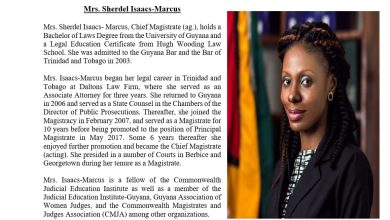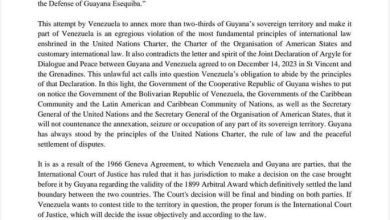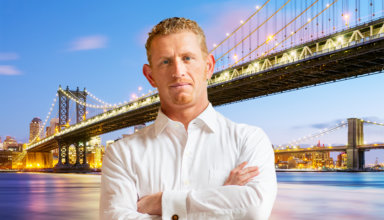Mayor Adams, Speaker Adams reach handshake agreement on budget

New York City Mayor Eric Adams, New York City Council Speaker Adrienne Adams, Council Finance Chair Justin Brannan and members of the City Council on Thursday announced an agreement for an on-time, balanced and fiscally-responsible about $107 billion Adopted Budget for Fiscal Year 2024 (FY24).
Despite facing strong headwinds, Mayor Adams said the budget makes upstream investments in working people, and keeps New York safe and clean, while contributing to the city’s robust savings program.
“The agreement we reached today comes in the midst of a budget cycle dominated by great challenges and unexpected crises, but I am proud to say that we have successfully navigated through these many crosscurrents to arrive at a strong and fiscally responsible budget,” said Mayor Adams.
“Our mission is not to simply save money — it is to set priorities, which include fair labor contracts for our unions, funding for education, the arts, and our libraries, and support for New Yorkers in the greatest need,” he added. “I thank Speaker Adams, Council Finance Chair Brannan and the entire Council for their partnership through this process.”
“The Council’s focus in this budget has been to protect the essential services that the people of this city rely on to be healthy, safe, and successful,” said City Council Speaker Adams. “We took seriously our task to negotiate the best possible outcomes and deliver results for the people of our city.
“Through difficult negotiations, the Council worked to bridge the distance between us and the administration, fighting to restore investments in essential services and funding many programs that we know our families, communities, and city need,” she added. “Though we have come to a budget agreement today, the Council knows we must continue to push forward in our year-long budgetary, legislative, and oversight efforts to secure the investments that New Yorkers deserve.”
The agreement on the $107 billion budget includes increased funding for youth jobs and apprenticeships and innovative educational programming for public school students.
As part of the budget agreement, the city is expanding access to Fair Fares discounted MetroCards, providing more meals for seniors and low-income New Yorkers, and extending the hours for many vacant early childhood education seats, so working families can more easily enroll their children.
Additionally, the budget takes advantage of higher-than-anticipated revenues to restore and provide additional funding for libraries and cultural institutions, which will both be funded at a higher level in FY24 than they were a year ago in the FY23 Adopted Budget, even before including City Council discretionary additions.
Further, no New York City Department of Education (DOE) public school will have an initial budget lower than their initial budget last year, even if their student population has declined.
The Adopted Budget was crafted in the midst of an ongoing asylum seeker crisis that is currently projected to cost the city $4.35 billion over Fiscal Years 2023 and 2024 –– with $2.9 billion in estimated spending over FY24 alone.
Though New York City continues the longstanding tradition of helping immigrants, Mayor Adams said the city has –– virtually on its own –– cared for more than 81,000 migrants since last spring, and has, thus far, received inadequate federal and state assistance.
For this reason, at adoption, he said the city must add $465 million in FY24 to make up for less-than-expected federal asylum seeker aid.
The mayor said his administration was able to balance the budget in adoption, despite substantial challenges by controlling new agency spending and through a higher-than-anticipated increase in the city’s revenue of $2.1 billion in FY23, driven by continued strength in the local economy –– though tax revenue growth is still expected to slow in coming years.
Mayor Adams said these additional resources were used to pay for agency needs, meet increased asylum seeker costs, and fund City Council discretionary spending and shared Adams administration/Council priorities.
Throughout this budget cycle, he said his administration has made tough choices that reflect an ongoing commitment to strong fiscal management, including by making government more efficient through budget savings and by maintaining robust reserves.
Since last June, the Adams administration has achieved gap-closing savings of more than $4.7 billion over Fiscal Years 2023 and 2024, which include less-than-anticipated agency spending of $72 million in FY23 and debt service saving of $137 million in FY23 and FY24 recognized in this plan.
Adams said these savings were achieved without reducing funding to programs or services, laying off a single employee, or cutting school or classrooms budgets.
The FY24 Adopted Budget maintains a near-record $8.0 billion in reserves, which includes $1.2 billion in the General Reserve, $2.0 billion in the Rainy Day Fund, $4.58 billion in the Retiree Health Benefits Trust, and $250 million in the Capital Stabilization Reserve.
Investment Highlights of the FY24 Adopted Budget include: Keeping New York City Safe and Clean – funding to expand Supervised Release services and pilot an “Intensive Case Management” model to provide stronger support for recidivists ($36.8 million; continuing the increased frequency of litter basket pickups citywide ($22 million)l; and funding the New York City Department of Sanitation’s highway cleaning program, which includes a focus on cleaning highways, medians, and road shoulders citywide ($9.6 million).
The highlights also include: Increasing funding for the CleaNYC program, which cleans streets and sidewalks in targeted corridors ($3 million); expanding neighborhood-based community navigators in Gun Violence Prevention Task Force districts ($1.9 million); and investing in technology to conduct a community sentiment analysis that will reach residents in an equitable and inclusive manner in order to evaluate the effectiveness of gun violence prevention interventions and deliver inclusive community-informed solutions to gun violence ($850,000).
Additionally, the budget includes providing funding for Cultural Institutions Group and Cultural Development Fund recipients ($40 million); adding funding for the public library systems ($36 million); providing workforce enhancement to support wage increases for contracted human services providers ($40 million, growing to $90 million in FY25); increasing annual funding for the Right to Counsel program ($36.6 million in FY24 and $30.6 million annually thereafter); and adding 5,000 slots to “Work, Learn & Grow” to provide Summer Youth Employment Program (SYEP) participants with school year employment ($22.5 million).
But immigrant advocates said they were disappointed in City Budget, but commended City Council’s efforts.
Murad Awawdeh, executive director, New York Immigration Coalition (NYIC), said that among the programs excluded from funding are providers who run reentry programs for individuals in city jails, as well as cuts to “essential” Department of Education programs.
“New York City’s number one asset is its people—the residents of this great city,” he said. “When we make thoughtful investments in New Yorkers our rate of return is immeasurable.
“We are disappointed to see that NYC’s FY24 budget has largely failed to make the kind of visionary investments needed to secure the well-being of every New Yorker,” Awawdeh added. “While the budget restores much-needed funding to our public libraries and for Promise NYC, the lack of deeper, more meaningful investments in the CUNY system and Department of Education programs and services will not only harm all students, but it will also harm the future of our city.
“The mayor’s continued scapegoating of asylum seekers and use of the cost of housing them as a rationale for austerity measures—including a lack of further investment in legal services funding—will ultimately hurt the ability of our newest New Yorkers to get on the road to employment, self-reliance, and their ability to leave the very same overburdened and costly shelter system,” he continued.
“We are grateful and thank the NYC Council Speaker Adrienne Adams, Finance Chair Justin Brannan, and the entire City Council for their leadership and for making important progress during the negotiations with Mayor Adams that ultimately restored many of the proposed cuts. We are thankful for the continued investments to Promise NYC, Adult Literacy, Access Health NYC, Immigrant Health Initiative, Welcome NYC, and Key to the City programs, which are all vital to ensuring that our immigrant neighbors can access the services they need to not just survive, but thrive in this city,” Awawdeh said. “We also acknowledge the Council Members who voted no on this budget because the five boroughs of NYC deserve better than the bare minimum that the Mayor is forcing on us.”
Theo Oshiro, co-executive director of Make the Road New York – which operates five community centers in Bushwick, Brooklyn; Jackson Heights, Queens; Port Richmond, Staten Island; Brentwood, Long Island; and White Plains, Westchester County. – said: “From the beginning of this year’s budget process, Mayor Adams has needlessly put crucial public services on the chopping block, while insisting on giving a blank check to an already-bloated NYPD that harms our communities on a daily basis.
“Our members and allies have fought nonstop to ensure that the city’s government uses its resources to ensure education, health care, housing, and more for every single resident,” he added. “We have also called out the mayor for his unacceptable attempts to pit communities against one another by blaming unnecessary budget cuts on asylum seekers who have come to our city, like generations before them, fleeing persecution and seeking a new life.
“We recognize that the Council has resisted many of the mayor’s worst proposed cuts and appreciate these efforts to protect services on which New Yorkers rely, including community schools, adult literacy programs, and health access. Still, we are frustrated by a budget that substantially increases funding to an out-of-control NYPD, with zero accountability,” continued Oshiro, thanking the Council Members “who fought for important initiatives for our communities, as well as those who spoke up against the unacceptable increases to the NYPD’s bloated budget.”





